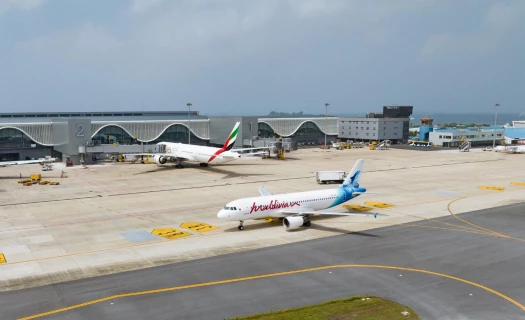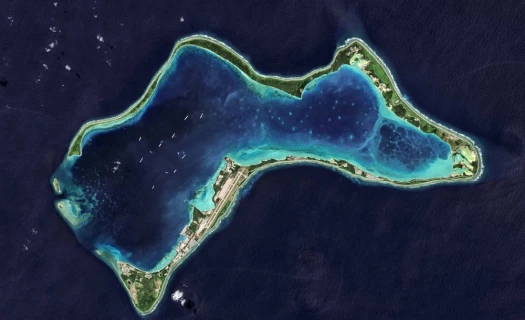Sustainability at the heart of Amilla Maldives Resort & Residences

Amilla Maldives Resort & Residences, nestled in the midst of the beautiful Baa Atoll, is a pioneer resort in sustainability.
Amilla Maldives Resort & Residences, a mere 35-minute scenic seaplane journey from Velana International Airport, calls Baa Atoll, a UNESCO World Biosphere Reserve, home. Blessed for being surrounded by such beauty, unique species of marine, fauna and flora of the Maldives, Amilla embarked on an eco-journey three years ago and has been on the same path ever since.
Amilla Maldives has recently launched it's first ever Sustainability Series on YouTube. This carefully curated visual depiction brings attention to the various sustainability actions carried out by this pioneer resort.
As an EarthCheck Silver certified property for the second year running, Amilla meets the highest sustainability standards in the hotel industry. Sustainability is in every thought, and every touch in Amilla with over 35 concurrent sustainability initiatives in place including solar energy, coral propagation, turning waste into wealth through on-site recycling and vastly reducing packaging waste through the Homegrown@Amilla and Homemade@Amilla programs. The resort goes one step further by purchasing items for villas made from recycled ocean-bound plastic, such as wet bags for damp swimwear, as well as protecting sea turtles, manta rays and white tailed tropic birds.
The island itself was used as an agricultural island for many years and therefore, Amilla retains 70% of its natural jungle. With this, the natural lush private island paradise features just 67 villas and residences, which translates into idyllic, untouched scenery and more space to play, relax and explore. The extensive jungle and abundance of undeveloped spaces has even drawn rare white tailed tropic birds (Dhandifulhu Dhooni) to nest on the island - a species that normally only nests on uninhabited islands and are endangered in the Maldives. Amilla is leading the way in studying these birds in the habitat to ensure their protection.
Amilla’s signature Homemade@Amilla program helps them reach their sustainability goals by dramatically reducing food packaging by making as many products as possible in house. This includes spa products made from their own coconut oil and native plants, as well as a range of food items like yogurt, jams and pickles for their kitchen. With wellness in mind, Amilla also makes a range of probiotic sodas including 8 flavors of Kombucha, and plant-based milks.
The Homegrown@Amilla programme helps Amilla reduce the impact on the environment and lower the carbon footprint by growing fresh produce in the gardens. Mystique Garden is located in the centre of the island where guests can meander through. Also featured at Amilla are a banana plantation, “Sweet Spot”, sweet potato garden and mushroom hut as well as its own hydroponics garden, to meet the resort kitchen’s salad leaf needs.
The UN, short for “UNdo the Harm” is Amilla’s centre for waste management. The resort’s waste is taken here, sorted and processed accordingly. Glass is crushed and used for cement for construction, plastic is prepared for recycling through Amilla’s partner Parley for the Oceans, and food waste is processed into nutritious compost for their gardens.
The Pentagon at Amilla grows delicious oyster mushrooms and the Cluckingham Palace is a chicken coop that was created so that guests can enjoy the freshest eggs every day. Most importantly, The Nut at Amilla is sustainability at its core - a dedicated coconut processing facility that utilises all the produce from more than 2,500 coconut trees in the naturally lush island. The facility makes coconut oil, vinegar, milk and cream as well as utilising the waste products to make nutritious coco peat for the gardens, and crafts.
Amilla’s resident Marine Biologist offers unsurpassable insight into the incredible Biosphere Reserve in which the island is located. Guests who stay at the resort can learn about the ocean, pursue adventures, experience the coral reef and participate in ongoing research to personally make a difference to our fragile environment. Amilla’s coral propagation program allows corals to regenerate and thrive by attaching coral fragments already broken off from parent colonies by boat anchors, storms and human interaction, onto metal frames and placing them in an ocean nursery, an ideal location for growth and regular monitoring and maintenance.
"Amilla's approach to sustainability is truly unique. We don't just focus on protecting the environment, but how the environment can be accessible to everyone, through our IncluCare program. We also try our best to contribute to these amazing ecosystems through the understudied White Tailed Tropic Birds, partnering with the Biosphere Reserve to further understand their nesting habits. We really understand how special our island is, and we want to protect it and share it with as many as possible"
Amilla’s Marine Biologist, Zoe Cox
Amilla has teamed up with the Manta Trust, an NGO dedicated to protecting manta rays and the marine ecosystems they inhabit. Since Amilla’s Dive Centre, Dive Butler runs trips for guests to Hanifaru Bay during Manta Season, as well as multiple manta cleaning stations in the area, the Amilla Islanders decided to play their part in helping to ensure the protection of the mantas by teaming up with the Manta Trust’s Maldivian Manta Ray Project and signing its Responsible Operator Agreement.
Amilla also has joined forces with the turtle conservation organisation, the Olive Ridley Project, to monitor and conserve local turtles. There are nine individual turtles that visit Amilla to feed regularly, and twelve juvenile Hawksbill Turtles that nest on the island, according to the resort’s latest research. Nests belonging to Green Turtles are the most common type of turtle nests found in the Maldives. However, at Amilla, both Green Turtles and less common Hawksbill Turtles nests have been located. Guests snorkelling on the extensive house reef can often see large turtles grazing or slowly swimming by, but the nests are carefully protected.














